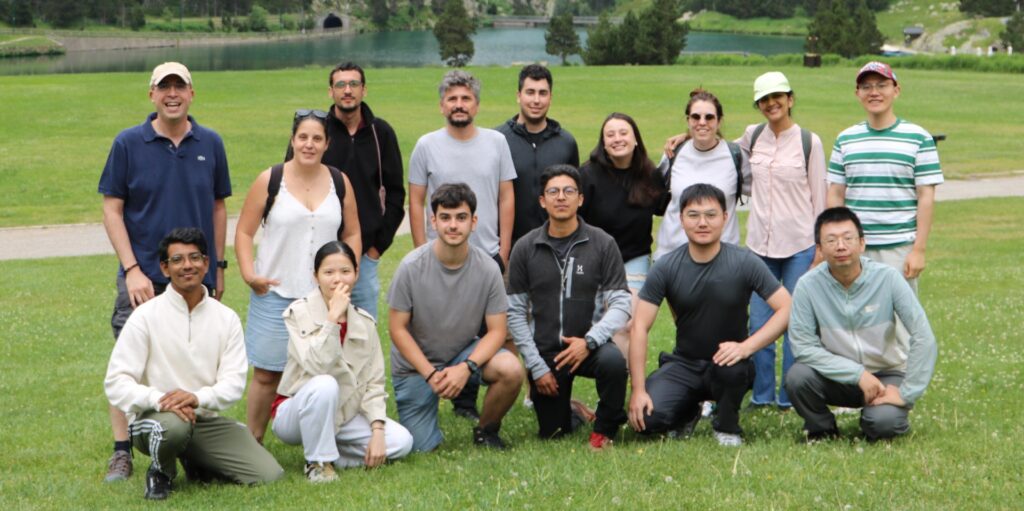The Catalan Institute of Nanoscience and Nanotechnology (ICN2) plays a central role in the PeCATHS project, leading Work Package 4 (WP4), which is dedicated to the advanced characterization of materials, catalysts, electrodes, and devices developed in WP1 and WP2.

This transversal work package aims to uncover the mechanisms that govern the performance of catalytic materials and electrodes, with a particular focus on how their structure, chemical composition, and three-dimensional morphology at the nanometric scale influence electrocatalytic activity. The ICN2 team, led by Prof. Jordi Arbiol and supported by Dr. Alba Garzón-Manjón, along with PhD researchers David Llorens and Eduardo Domínguez, brings world-class expertise in atomic-scale analysis and AI-enhanced microscopy to this endeavor.
ICN2 conducts a comprehensive structural, chemical, and morphological characterization of fresh and used (photo)electrode materials. This includes the use of scanning and transmission electron microscopy ((S)TEM), scanning electron microscopy (SEM), focused ion beam SEM (FIB-SEM), energy dispersive X-ray spectroscopy (EDS), and electron energy loss spectroscopy (EELS). Additionally, X-ray photoelectron spectroscopy (XPS) and core-loss EELS are employed to measure composition, oxidation states, core level energies, band gaps, and valence band positions before and after operation. ICN2’s advanced methodologies, including monochromated EELS and 4D-STEM, allow for in-depth analysis of crystallinity, interfaces, atomic arrangement, and local plasmon and bandgap energy distributions. Differential phase contrast STEM (DPC STEM) is used to visualize electromagnetic field distributions and explore the relative positions and distortions of atoms within catalytic nanostructures. To ensure high statistical throughput, ICN2 applies its proprietary AI-enhanced tools to automatically identify crystal phases and orientations from atomic-resolution STEM images.
Beyond ex-situ analysis, ICN2 integrates its characterization work with operando electrochemical experiments, enabling a holistic understanding of energy mechanisms. This approach facilitates the correlation between surface structure and charge transfer behavior with electrocatalytic performance. The team investigates how subtle atomic-level features—such as dopants, vacancies, defects, and changes in coordination or oxidation states—can influence the behavior of nanostructured materials, including nanoparticles, single-atom catalysts, and 2D materials. These insights are critical for optimizing the photoelectrochemical processes at the heart of PeCATHS, which involve the transformation of biomass derivatives and the hydrogenation of Liquid Organic Hydrogen Carriers (LOHCs).
ICN2 collaborates closely with project partners UJI and UZH, who are responsible for preparing and assessing (photo)electrodes. While UJI and UZH focus on electrode fabrication and electrochemical characterization, ICN2 provides atomic-scale insights into substrate–electrode interactions and material behavior. Theoretical modelling conducted by TCD complements ICN2’s experimental data, creating a robust framework for understanding and improving energy conversion systems. All partners contribute their expertise in a fully integrated effort, with knowledge transfer coordinated through COMET and EIM, and supported by dedicated communication, dissemination, and exploitation strategies.
ICN2’s impact extends well beyond the scope of PeCATHS. The ICN2 PI coordinates the materials science infrastructure projects In-CAEM and METCAM at the Joint Electron Microscopy Center at ALBA Synchrotron (JEMCA) and is a founding member of e-DREAM, the European Distributed Research Infrastructure for Advanced Electron Microscopy. ICN2 continues to expand its portfolio of analytical and consulting services for industry, reinforcing its leadership in STEM-based catalyst characterization and AI-driven microscopy. Through its contributions to PeCATHS, ICN2 is not only advancing sustainable energy technologies but also shaping the future of materials science across Europe.